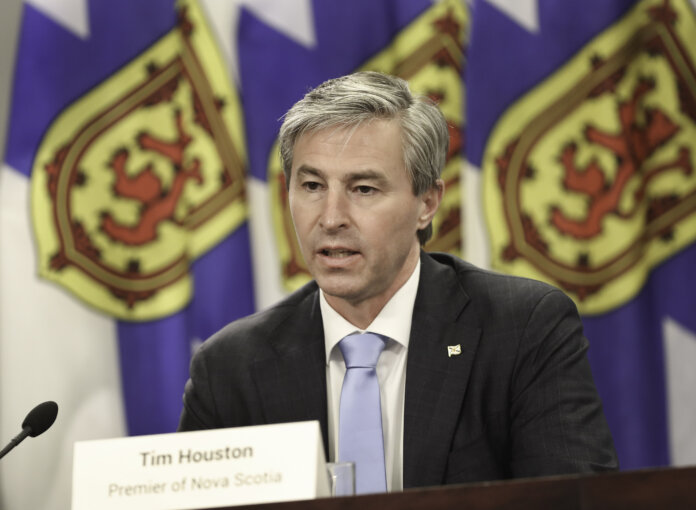HALIFAX: The government passed a budget that makes historic investments in healthcare and passed legislation to support Nova Scotians and help them start families, dismantle racism and hate and enshrine Mi’kmaw as Nova Scotia’s first language during the spring legislative session, which wrapped up April 22.
The government also tabled Action for Health, a strategic plan to address recent and longstanding issues in healthcare.
“We listened to Nova Scotians and healthcare workers across the province and are taking action based on feedback from those who know the system best,” said Premier Tim Houston.
“We have a plan to move forward and the investment behind it to make transformational change. Now, we’re ready to continue our focused work.”
Budget 2022-23: Solutions for Healthcare, Solutions for Nova Scotians includes a $5.7 billion investment in healthcare and solutions to improve the Province’s workforce, economy, housing and roads.
As part of the budget, amendments to the Income Tax Act were passed that will help Nova Scotians start a family. The government will offer a refundable tax credit equal to 40 per cent of the cost of fertility treatments provided by a Nova Scotia-licensed medical practitioner or infertility treatment clinic and for surrogacy-related medical expenses.
This measure makes Nova Scotia the first province in Canada to provide this kind of support for surrogacy, including for the 2SLGBTIQ+ community who previously had no option but to pay the full cost.
The session began with the Premier delivering a statement on the war in Ukraine and Volodymyr Zelensky’s leadership during the crisis. Members of the Legislative Assembly unanimously passed the Ukrainian Famine and Genocide (Holodomor) Memorial Day Act, put forward by the Official Opposition, to create a memorial day each November to commemorate the millions of Ukrainians who died at the hands of a dictatorship-led famine ninety years ago.
The Dismantling Racism and Hate Act, developed by an all-party committee following extensive engagement with Nova Scotians, was also introduced this session and outlines the government’s approach to addressing systemic racism, hate and inequity. It also commits to developing a provincial strategy and a health equity framework by July 2023.
The government passed legislation recognizing Mi’kmaw as Nova Scotia’s first language and will support efforts to preserve and promote it now and for future generations.
“Last session the government passed 22 pieces of legislation. This session we passed another 31 important bills that will make a difference in the lives of Nova Scotians,” said Premier Houston. “We have an ambitious mandate to fix healthcare, increase housing, protect the environment and rebuild the economy and legislation passed this session will help us move forward.”
Among other legislation passed:
— amendments to the Electricity Act to protect solar homeowners and small businesses in the solar industry
— amendments to the Public Utilities Act that will push Nova Scotia Power to ensure that ratepayers have reliable, cleaner power and further hold the utility accountable for how it delivers electricity
— amendments to the Halifax Regional Municipality (HRM) Charter to help streamline, improve and shorten the approval process for residential housing developments
— enable the government to create a wine authority to administer a quality standards program for Nova Scotia wines
— amendments to the Liquor Control Act to permanently allow third-party delivery of alcohol with food orders
— amendments to the Motor Vehicle Act will permit the safe operation of electric kick scooters (e-scooters) on municipal roadways
Highlights from Budget 2022-23 include:
— $14.5 million more to make virtual care available to everyone on the Need a Family Practice Registry
— $3.2 million to add 200 new nursing seats, at Cape Breton University (28), Dalhousie University (26), St. Francis Xavier University (26) and Nova Scotia Community College (NSCC) (120 practical nursing)
— $2.1 million to address surgery backlogs due to COVID-19 at IWK Health Centre and to fund more cataract surgeries in the province
— $22.9 million to continue delivery of COVID-19 vaccines and boosters to Nova Scotians
— $3.4 million more to expand mental health virtual care, including hiring 22 clinicians over two years, for Community Mental Health and Addictions outpatient clinics and enhancing virtual care services at emergency departments
— $1 million to open the province’s first mental health acute day hospital at the QEII Health Sciences Centre
— $66.3 million to provide continuing care assistants (CCAs) with the highest wages in Atlantic Canada
— introduction of the More Opportunities for Skilled Trades program, which, starting in the 2022 tax year, will return provincial personal income tax paid on the first $50,000 of earnings for eligible people under the age of 30
— $15 million more for affordable housing programs and $2.7 million more for new rent supplements associated with quick start investments
— $113.2 million investment in child care, including lower fees for families, creating more spaces and enhancing after-school care (fully recoverable from the federal government under the Early Learning and Child Care Agreement)
— $54.2 million increase for programs that support adults and children with disabilities
— $12.5 million for the Nova Scotia Child Benefit to support reducing childhood poverty
— $29.2 million from Municipal Affairs and Housing as the provincial share of green projects and transit projects under the federal Investing in Canada Infrastructure Program– $507.8 million for Nova Scotia’s roads, highways and bridges, including a new
$30-million envelope for bridge repair and renewal and $20 million more for gravel roads
Additional Resources:
Budget 2022-23: Solutions for Healthcare, Solutions for Nova Scotia: https://novascotia.ca/budget/
The complete list of bills passed this session: https://nslegislature.ca/legislative-business/bills-statutes/bills/assembly-64-session-1


































